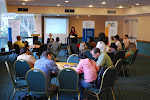Editorial
Old and Disabled - Disabled and Old
Megan A. Conway, Ph.D.
RDS Editor
I was born old, or so I sometimes tell myself. Bad eyes. Bad ears. Bad hips. Creaky joints. When faced with people who don’t seem to comprehend the meaning of the words, “Please speak up, I am hard of hearing,” I find myself explaining, “It’s just like with your grandmother. Pretend I am your hard of hearing grandmother and you’ll be fine.” “Ooooooh,” the light dawns and, yes, they do speak louder, and also treat me like I am feeble minded. You know. Old.
A generation of once boogying Baby Boomers is getting old and they don’t want the music to stop. The little reading glasses are popping out of pockets with an apologetic cough and a dismissive, “You know how it is.” Advertisements are everywhere for “invisible hearing aids” with photos of smiling sort of older looking people playing golf or laughing with their sort of older looking spouse over a bottle of wine. Don’t call it a “disability” because it can be fixed. I wish I could go back to school and become an orthopedic surgeon specializing in hip replacement surgery. Or plastic surgery. Or any field designed to make old people look/feel/act younger. Fund my active retirement, you know?
The irony of the anti-aging movement is that in some ways it has benefited people with disabilities. Those state-of-the-art hearing aids, large smart phone screens and “mainstream” surgeries benefit us too. But in other ways this movement has hurt us deeply. The stigma of disability grows more pervasive by the day. Trying to forge an alliance with an older generation who spends its time running from the inevitable ravages of time seems fruitless. Our only hope is that the generation who gave us the Free Love movement and the Civil Rights movement will also give us the Love Your Age Movement. Let your grey hair flow and your hearing aids show...
But we are getting older too. People who have lived with a disability for years now find that age and its new crop of disabilities demand a new examination of their strategies for living and self-identity. As a born-disabled I am quite comfortable with my identity as a disabled person. You wouldn’t have to pay me to get me to stand up in a crowded room and shout, “Disabled people rule!” But a couple of years ago my husband, god knows he regrets it now, took a photo of the top of my head because I wouldn’t believe him when he told me my hair was going grey. Let us just say that a significant amount of our family’s income is now going to a very expensive hair salon. No way am I going grey. That would make me look old.


